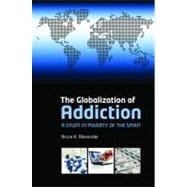
Note: Supplemental materials are not guaranteed with Rental or Used book purchases.
Purchase Benefits
What is included with this book?
| Roots of Addiction in Free-market Society | |
| Vancouver as prototype | |
| Addiction1, Addiction2, Addiction3, Addiction4 | |
| The dislocation theory of addiction | |
| Psychosocial integration is a necessity | |
| Free-market society undermines psychosocial integration | |
| Addiction is a way of adapting to dislocation (1) - historical evidence | |
| Addiction is a way of adapting to dislocation (2) - quantitative research, clinical reports and 'spam' | |
| Addiction is a way of adapting to dislocation (3) - the myth of the demon drugs | |
| The Interaction of Addiction and Society | |
| Addiction and society | |
| The role of addiction in the civilised madness of the 21st century | |
| Getting by | |
| Spiritual treatment for addiction: the 'fifth pillar' | |
| Socrates' 'Master passions' and Dikaiosune | |
| From blindness and paralysis to action | |
| Social actions to control addiction: question period | |
| Table of Contents provided by Publisher. All Rights Reserved. |
The New copy of this book will include any supplemental materials advertised. Please check the title of the book to determine if it should include any access cards, study guides, lab manuals, CDs, etc.
The Used, Rental and eBook copies of this book are not guaranteed to include any supplemental materials. Typically, only the book itself is included. This is true even if the title states it includes any access cards, study guides, lab manuals, CDs, etc.